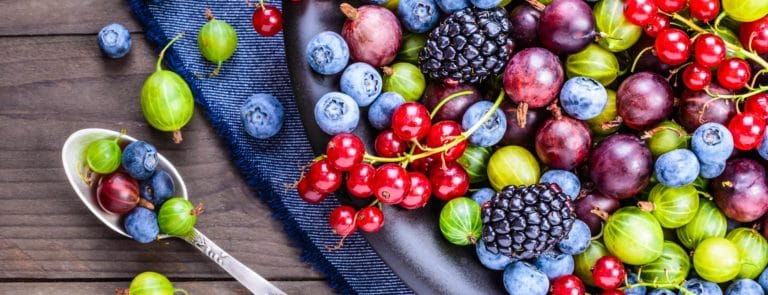Antioxidants have received a lot of hype in recent years over their supposedly ‘miraculous’ health-giving properties and ability to fight free radicals. But what exactly are they, do they live up to the hype, and how can you make sure you’re getting enough?
What are free radicals?
There are trillions of cells in your body, and you may not realise it, but they’re constantly trying to protect themselves from damaging compounds known as ‘free radicals’. Free radicals, also known as oxidants, are found freely in the environment such as in smoke and air pollution. Free radicals are the agents that cause oxidative stress, which is what triggers damage to your cells.
1
Your body actually produces free radicals on its own, too. This is totally normal and helps you fight off bad bacteria and infections. However, due to various lifestyle factors many people end up being exposed to too many free radicals, and the resulting cell damage can cause various health issues and premature ageing of the body.
It’s possible to limit the damage caused by free radicals and give your body the best chance of avoiding oxidative stress and cell damage. Things like not smoking, staying out of the sun and not eating junk food are all basic steps towards reducing free radical damage. However, diet plays a huge role in protecting you from free radical damage, and that’s where antioxidants come in.
What are antioxidants?
Antioxidants are vitamins and minerals that help prevent and repair the cell damage caused by free radicals. Antioxidants are found in many common foods, primarily plant sources like fruits and vegetables. Here are some common types of antioxidant to include in your diet, and the foods that are rich in them:
Carotenoids
These are found in the pigment of brightly-coloured fruit and vegetables. They play a major role in the protection of plants against oxidative damage, and form part of the antioxidant defence system in humans too.
2 Yellow, orange and red fruits and green leafy vegetables are known to be especially rich in carotenoids.
3 Sources include carrots, spinach, sweet potatoes and tomatoes.
Handpicked content: Vitamin-rich spinach and delicious recipe ideas
Flavenoids
Flavenoids are able to directly scavenge and neutralise free radicals.
4 You can find flavonoids in onions, broccoli, berries, black tea, citrus fruits, herbs such as parsley and thyme.
Vitamin C
Vitamin C, also known as ascorbic acid, is actually an antioxidant despite its acidic qualities. Vitamin C can eliminate reactive oxygen species, a form of free radical.
5 You don’t make vitamin C in your body, so you must consume it through your daily diet. Sources of vitamin C include peppers, strawberries, kale and mango.
Handpicked content: A tasty way to up your vitamin C
Vitamin E
Vitamin E refers to a group of fat-soluble compounds with antioxidant properties. They are known to reduce the effects of food toxins and environmental pollution in the body, as well as having general anti-inflammatory effects on the body.
6 Vitamin E is found in almonds, avocado, sweet potato and spinach.
Selenium
This essential mineral has various benefits including boosting immunity, male fertility and promoting good cardiovascular health. It also offers protection against excess reactive oxygen and nitrogen species in the cells, meaning it’s a powerful antioxidant.
7 Find selenium in brazil nuts, mushrooms and chia seeds.
Handpicked content: Spotlight on selenium
Are antioxidants worthy of the hype?
Yes and no. Research is increasingly suggesting that many diseases have their origins in free radical reactions within the body,
8 and antioxidants have proven to be very promising in terms of helping to fight them, protecting our bodies from oxidative stress and cellular damage.
However, there is no quick-fix for maintaining overall health, and there is no antioxidant or ‘wonder-food’ which in isolation can solve health problems. So, the most sensible approach to get the benefits of all the dietary nutrients on offer to your body is to eat a varied antioxidant-rich diet high in fruit and vegetables, as this has been strongly linked with helping to protect you from diseases.
9
Advice is for information only and should not replace medical care. Please check with your GP before trying any remedies.
Shop Vitamins & Supplements
Sources
1
https://www.ncbi.nlm.nih.gov/pmc/articles/PMC3249911/
2
https://www.ncbi.nlm.nih.gov/pubmed/14585305
3
https://www.ncbi.nlm.nih.gov/pmc/articles/PMC3942711/
4
https://pdfs.semanticscholar.org/978e/25213fa37eb59713313bd730792d51cffe25.pdf
5
https://www.ncbi.nlm.nih.gov/pmc/articles/PMC5472873/
6
http://www.antioxidants.org/vitamin-e
7
https://www.ncbi.nlm.nih.gov/pmc/articles/PMC2698273/
8
https://www.ncbi.nlm.nih.gov/pubmed/7619452
9
https://www.imperial.ac.uk/news/177778/eating-more-fruits-vegetables-prevent-millions/




